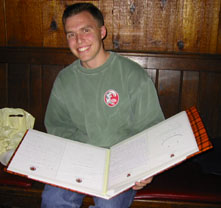|
Web Exclusives:On the Campus... November
21, 2001: By Liriel Higa '02 Jon recognizes that staying in ROTC and becoming an officer in a couple of years, or joining now, as an enlisted man will not make much difference for the country; either way, this war will probably still be happening. But it will make an enormous difference for him personally. As he explains it, he wouldn't be content to make a bunch of signs, organize a rally supporting the war, then return to his dorm room to study the intricacies of Shakespeare. Jon had a self-described "lightbulb moment" while sitting in his Religion 230 lecture, "a wonderful class, discussing the semantics of the Old Testament and how scholars make distinctions to determine the different sources that contributed to it. Professor Himmelfarb said that in one area, a scholar was on to something very important. I thought, 'No, that's not important at all.'" It was moments of clarity such as these, as well as visiting New York City and seeing the altered skyline, that have prevented him from ever doubting his decision. Jon acknowledges the romantic connotations of the military, but he has realistic expectations. Both of his grandfathers fought in World War II and his father was in ROTC; he also has a few friends in the military. He characterized the work he expects to be doing as somewhat "banal, but important, and vital to the nation's security." He doesn't foresee the military becoming his career, but nor is he ruling it out. He will start taking tests as soon as he gets home to Modesto, California, and will begin six weeks of basic training at the Lackland Air Force Base in San Antonio in January. Ultimately, Jon would like to become a "cryptologic linguist" (translator), and foresees himself stationed at a base in the Middle East, translating Arabic into English. Although he doesn't believe he will ever be in great personal danger, insomuch as a military base will ever not be a target, he does admit to feeling fear: "Anyone with a pulse would." Jon's view of America's position in the war is hardly one-sided, as he acknowledges that America's Middle East policy may have contributed to the current state of affairs. Regardless, he believes that the actions we are taking now are correct. As he sees it, U.S. policy after World War II arguably contributed to the rise of Hitler and Nazism; however, that didn't mean that we didn't have an obligation to stop it. Similarly, changing our Middle East policy is phase two of the war; addressing the immediate threat to our country is phase one. He will be leaving after fall break; two days from now as I write this. Jon addressed the schizophrenia I feel, along with so many others, as we try to continue with our daily routine as though all was normal even as we hear daily of bombing raids in Afghanistan and anthrax attacks in the U.S. "I don't think anyone is wrong for not leaving because everyone will be contributing," Jon told me. "Studying history and religion and biology creates a culture worth defending." Reaction to Jon's announcement has been only positive. His father is not surprised; his mother and sister are supportive, though concerned; his 14-year-old brother thinks it's cool. Even students and professors that disagree with the war have told him that they admire him for his decision.Jon dismisses any suggestion that "because I have a Princeton education I should wait till I can be of more help later." He doesn't see himself as a hero, or extraordinary in any sense of the word: "I'm a 21-year-old guy, people like me fight wars." Princeton, he believes, should not make us feel obligated to enter certain professions, since we're capable of doing so many things. At the same time, he feels his own sense of obligation, to the country. "Duty is a different kind of 'should,'" Jon said. "This 'duty-should' is what feels most natural and right to me." Liriel can be reached at lshiga@princeton.edu
|

 On
September 12, Jon di Cristina '02 decided to join ROTC. At the time,
his options were clear: join ROTC or immediately enlist. Initially,
enlisting seemed rather drastic; after all, he'd just returned to
Princeton after taking a year off. However, after a few weeks of
balancing drills and classes, Jon decided that the Air Force was
where he really belonged.
On
September 12, Jon di Cristina '02 decided to join ROTC. At the time,
his options were clear: join ROTC or immediately enlist. Initially,
enlisting seemed rather drastic; after all, he'd just returned to
Princeton after taking a year off. However, after a few weeks of
balancing drills and classes, Jon decided that the Air Force was
where he really belonged.